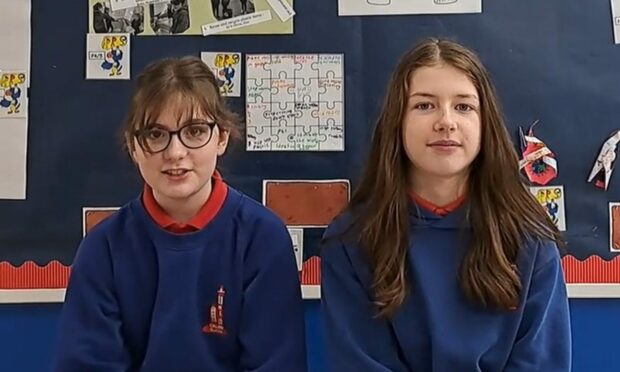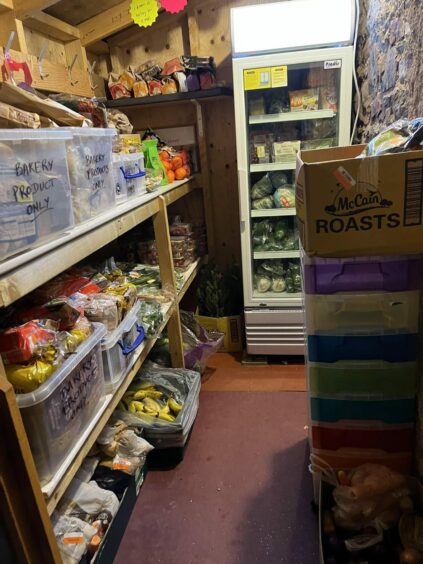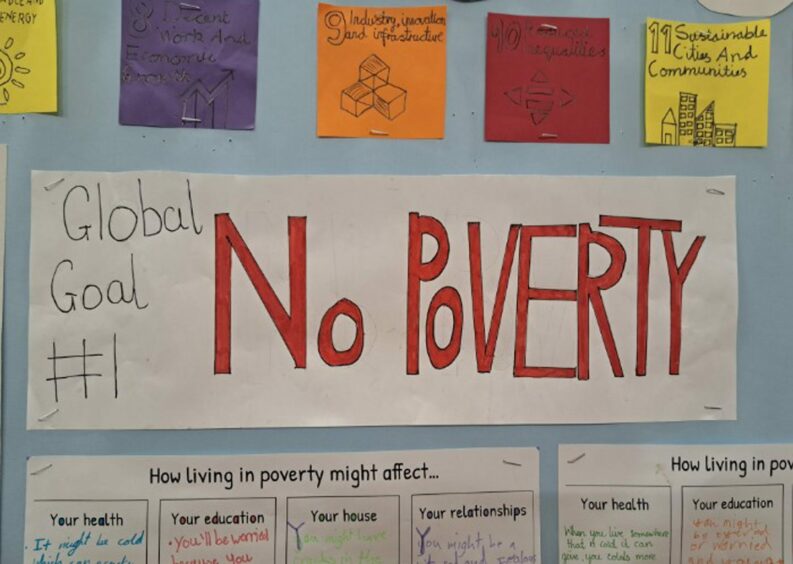Schools across the north and north-east are doing their bit to help local families get through the cost-of-living crisis.
If the cost-of-living crisis feels like a daily battle, our schools are on the frontline.
Many have stepped up to support local families by helping them to reduce costs and access local resources. Others have embedded financial literacy in their curriculum, teaching kids about everything from global poverty to opening a savings account.
At Crown Primary School in Inverness, teachers say they’re “blown away” by the compassion and maturity shown by their pupils.
And they hope it goes some way towards reducing stigma and encouraging families to access the help that’s available to them.
No need for shiny pencil cases
Crown Primary School has set that tone from day one of the school year. “We don’t want to see lots of kids coming in with shiny new pencil cases with all the glittery pens and glue sticks,” says head teacher Suzanne Dunbar.
“We reassured parents that we’ve got all that stuff in school. We’re trying to take a lot of that pressure away.”
This also applies to buying school uniform. Crown’s parent council runs a uniform swap shop, highlighting that it’s not necessary to buy new every time.
The school extends that topic into the classroom, with pupils debating whether uniform is a good thing. Many kids said they thought it was, because it removes the pressure to have the best labels and newest trainers.
Crown links in with wider support in the community too, including a local community cupboard. Volunteers go round the supermarkets collecting food and donations – one family who recently lost their dog donated a large amount of dog food. The community cupboard is open 8am to 8pm and is available to anyone who needs it.
The school promotes the sharing larder on their blog and also highlights free activities and events locally. They recently promoted High Life Highland classes on paperwork and finances.
Cost-neutral school trips
This week is World Book Day, and it’s often little extra-curriculars like this that hit parents in the pocket. Who hasn’t made a late night panic dash to the supermarket for a £25 costume?
“Historically on World Book Day pupils come in all their fancy dress,” says Suzanne. “Actually, we don’t want people going out buying anything. Use what you have in the house, dress down, wear your pyjamas. Whatever you want to do, we’re making it more free.”
The school is also minimizing the number of charity events it supports, so it doesn’t create pressure on parents to make a donation.
And when it comes to the big school trip, Crown Primary is one of a number of schools working to make these cost neutral. This means more modest outings locally, or for residential trips, signposting funding schemes such as the Highland Children’s Trust Scheme.
“We’re trying to be mindful of what we’re asking parents for,” says Suzanne. “Schools have a role to play in educating at an early stage and trying to be supportive, but there’s still some stigma around talking about money.”
School pupils learn about cost-of-living crisis
Addressing that stigma is no easy task, but Crown is breaking down barriers by talking to pupils about poverty and the cost-of-living crisis from a young age.
And it seems that even the youngest pupils have an innate sense of social justice.
Suzanne recalls: “I was working with the younger children and told them we have a cake, but there’s not enough for everybody. What are we going to do about it? I was blown away by their attitudes. They said it was okay, maybe they’ll get a bit next time, or we can divide it into smaller pieces.
“There was lots of creativity and problem solving around it. Nobody was upset about not getting their theoretical piece of cake! They were quite thoughtful of other people and their situations.”
Moving up through the school, pupils have had a go at party planning on a strict budget, and heard from banks about salaries, money habits, savings and debt.
The pupils learned that 24% of Scottish children live in poverty, remarking “It’s a really shocking number.” They learned about poverty on a global scale, and the impact that poverty can have on people’s physical and emotional health, work, education and relationships.
Keen to do their bit, the pupils wrote letters to supermarkets asking them how they plan to help people in poverty. They suggested cutting their prices and donating to local food banks and sharing sheds.
Here are P6 pupils Pippa Muir and Anna MacFarlane discussing poverty.
‘It’s okay if you’re struggling’
By helping pupils to understand the cost-of-living crisis, Crown Primary School hopes it will ease the burden a bit for parents. Over time, some of that stigma may start to reduce.
“We have events where parents come in and we ask if there’s anything they need support with,” says Suzanne. “What parents have asked for at the moment is just a place to get to know each other and share ideas.
“There is quite a stigma around whether you have money or not, so it’s getting families to open up.
“During Covid, some people weren’t able to keep their jobs and maybe lost their house. Everyone experienced the difficulties of the Covid period and that maybe changed attitudes a little bit.
“By working with the children and speaking about it, they’re going home and sharing those messages. It gets through that it’s okay if you’re struggling, we can point you in the right direction.”
More from the Schools & Family team
‘Well worth the wait’: Opening day arrives for Ness Castle school
World Book Day special: How to get kids off screens and into books



Conversation